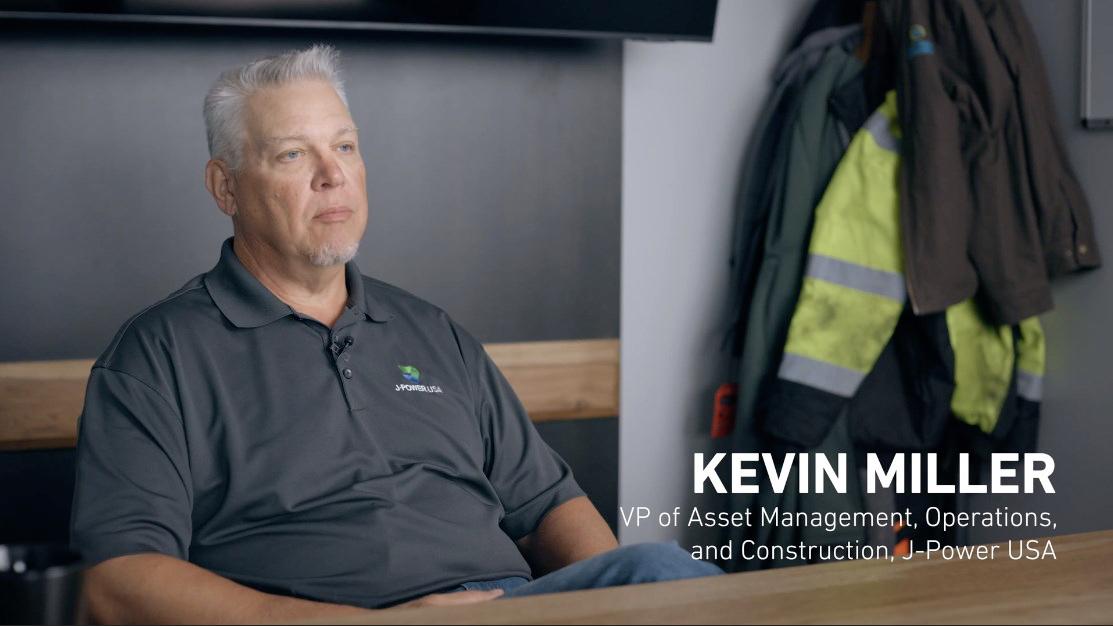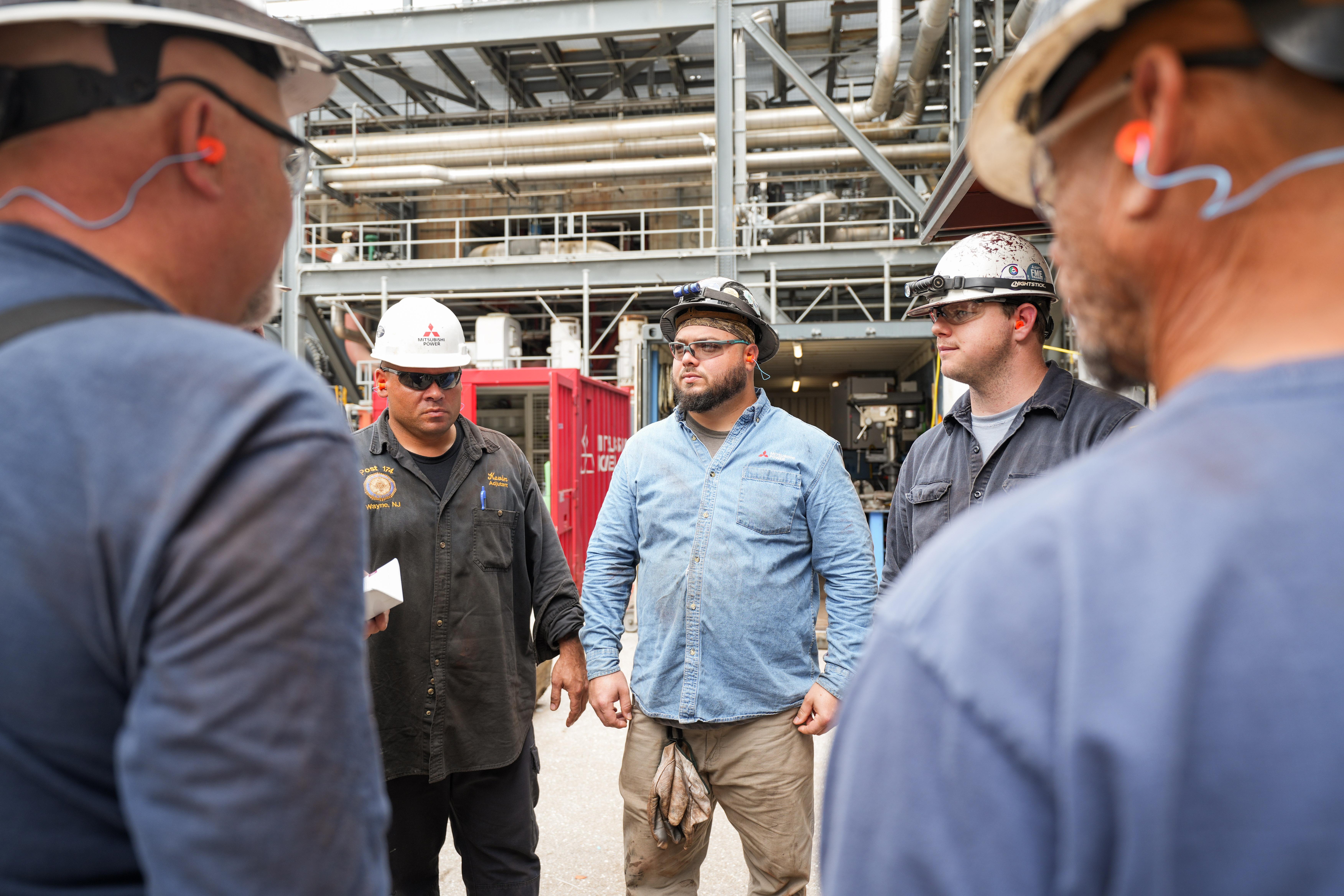
INSIGHTS
Enabling Outage Excellence at Mitsubishi Power

Whether planned years in advance or occurring unexpectedly due to unforeseen circumstances, outages require exceptional coordination, technical expertise, and the dedication of skilled professionals to minimize disruptions to the power supply that our communities depend on. Because of this, outages are a critical part of maintaining the reliability of power generation systems. They allow for the essential maintenance, upgrades, and repairs of gas and steam turbines to ensure optimal performance. And that means outages are a critical part of any commitment to excellence.
At Mitsubishi Power, outage execution has always been a foundational pillar of the operational excellence philosophy. Over the years, our company has honed its processes, developed robust planning methodologies, and fostered a culture of collaboration to meet the unique challenges each outage presents. At the center of all progress is the consideration and training of the people. In this spirit, the company recently integrated a new philosophy to enhance and support existing strategies. Human & Organizational Performance (HOP) emphasizes proactive planning, open communication, and continuous learning, thereby complementing Mitsubishi Power’s established practices, helping teams execute outages with even greater efficiency and safety, reducing downtime.
Types of Outages in Power Generation
Maintaining and upgrading gas and steam turbines requires carefully managed outages, which can be divided into two primary categories:
Planned Outages
Planned outages are scheduled maintenance events based on the expected life of parts or operational requirements. For example, on average, gas turbines need to have their parts replaced every 24,000 hours. So, planning begins 24 to 36 months in advance of that period, to ensure all necessary components, personnel, and logistics are accounted for.
“A planned outage is one where we schedule in advance, order the correct parts, set up our vendors, and perform reliability maintenance on the unit based on how many hours are on the machine.” Jon Presby, HOP Strategy and Integration Manager at Mitsubishi Power
These outages are crucial for ensuring that power generation units are ready for peak demand seasons, thereby increasing reliability and preventing unplanned outages.
Unplanned Outages
Unplanned outages, also known as forced outages, occur due to unexpected failures. These emergencies require immediate action to address issues such as damaged components or operational hazards. In such cases, Mitsubishi Power must quickly mobilize crews, conduct investigations, review machine data, and determine the necessary repairs.
The Importance of Effective Outage Planning
Outage planning is vital not only for the smooth operation of power plants, but also for minimizing broader economic and social impacts. Every outage is different, and every country is different. Unique influences, including geographical location, local regulations, and resource availability impact the outages and related plans. Predictably, proper planning is key to ensure a continuous power supply and prevent disruptions that could lead to significant consequences. In some regions, like the Dominican Republic, power plants supply the majority of energy to entire cities, making handling outages particularly critical. Without proper preparation, outages can result in extended blackouts, substantial financial losses, and strained customer relationships – not to mention the disruption to the local communities.
Effective outage planning, therefore, is not just about maintaining machinery—it’s about sustaining communities and economies.
Common Outage Challenges
Logistics and Supply Chain
The planning process for outages is extensive and begins years in advance in order to overcome supply chain issues. For planned outages, Mitsubishi Power starts preparing a couple of years ahead, ensuring that all necessary parts, tools, and resources are available. This involves detailed logistical planning, including the mobilization of parts across different countries and regions.
Execution and Coordination
Executing an outage involves coordinating multiple teams and managing various tasks simultaneously. This includes conducting pre-job briefings, risk assessments, and implementing error prevention techniques. The goal is to identify potential hazards and implement controls before work begins. In the office, thorough planning and clear communication ensure that teams are aware of potential risks and equipped to handle them effectively.
People: The Heart of Outage Success
One of the key aspects of outage planning and execution is the human element. These dedicated professionals often take on extensive travel, often for the majority of the year, and can work demanding 12-hour shifts in dynamic, high-stakes environments. While this schedule requires significant commitment and adaptability, it also reflects the resilience and dedication of the individuals who make these projects successful. Jon Presby, who has extensive experience in the field, highlights the commitment required: “It can be Christmas Eve, and they just get a call to go to an outage in the next three hours or tomorrow morning. They reshuffle their lives to prioritize their jobs.”
At Mitsubishi Power, we recognize that people are at the heart of our business, and our success lies in the dedication and expertise of our employees. Field service teams are the frontline heroes of outage execution, and they work tirelessly, often under challenging conditions, to ensure that maintenance and repairs are carried out efficiently and safely.
This is why we rely on our robust Project Management Office (PMO), Service Operations, and Service Execution teams. These three primary teams are responsible for the meticulous planning, coordination, and execution required to ensure outages are completed smoothly, avoiding delays or setbacks.
A practical solution: Human & Organizational Performance (HOP)
As a Japanese company, Mitsubishi Power embraces the kaizen philosophy of continuous improvement. This commitment to excellence led to the implementation of the Human & Organizational Performance (HOP) framework.
HOP is an operating philosophy that bridges the gap between how work is planned and how it is actually performed in the real world. While applicable to every job at Power Generation Services, we want to highlight its impact on outage planning and execution, where it helps address complexities through proactive planning, collaboration, and continuous improvement. HOP is built on five key principles that shift the focus from individual accountability to enhancing the interaction between people and systems—ultimately improving safety, efficiency, and reliability.
Key principles of HOP include:
• People Make Mistakes: It's a powerful mindset shift that leads to safer, more resilient organizations built on learning, not blame.- • Blame Fixes Nothing: Focusing on learning and improvement rather than assigning blame.
- • Learning is Vital: Encouraging open communication and learning from near-misses and incidents.
- • Context Drives Behavior: Designing processes and systems to account for human variability and reduce error likelihood.
- • Response Matters: The way we react to failure determines whether we build fear or foster growth.

By integrating HOP into its outage execution processes, Mitsubishi Power enhances its ability to deliver projects more efficiently while upholding the highest standards of safety and quality. The adoption of HOP tools, such as stop-work authority and peer checks, has reinforced a culture where workers feel empowered to speak up and address issues as they arise. This has fostered an environment of accountability and trust, where the priority is not just to follow procedures but to ensure the well-being of everyone involved.
Trainings and Certifications
A cornerstone of HOP’s success at Mitsubishi Power is its structured training and certification programs, designed to embed HOP principles into the daily activities of employees at all levels. These programs ensure that the workforce is equipped with the skills and tools needed to implement HOP effectively, contributing to continuous improvement and operational excellence.
• 12-Hour Foundational Training: This essential program introduces employees to core HOP tools and techniques, such as pre-task briefings, risk assessments, and error prevention strategies. It provides a solid foundation for applying HOP principles in daily tasks, enhancing awareness and preparedness.
• HOP Champions Certification: Through a competitive application process, employees from all levels and teams are selected to participate in this intensive, one-week certification course delivered by the University of Alabama at Birmingham (UAB). Participants earn three Continuing Education Units (CEUs) and develop advanced skills to champion HOP practices. Currently, we have 45 employees who have gone through the HOP champions training, and they play a pivotal role in leading initiatives, fostering collaboration, and ensuring consistent application of HOP strategies across both field and office environments.
• Behavioral Training: Mitsubishi Power places a strong emphasis on the behavioral aspect of HOP, investing in programs that enhance communication, emotional intelligence, and teamwork. These efforts strengthen team dynamics, enabling better decision-making under high-pressure situations and promoting a collaborative work culture.
Measurable Outcomes
The implementation of HOP has yielded measurable improvements in safety, efficiency, and overall project execution:
• Minimized Errors and Rework: By proactively identifying potential errors during pre-task briefs, we’ve been able to drastically reduce rework and corrections, keeping our projects ahead of schedule.
• Enhanced Safety Records: If you embrace the HOP philosophy properly, you’re avoiding incidents in everything you do, from the field to the office.
• Improved Communication and Collaboration: Structured debriefs, turnovers and open dialogue have streamlined workflows and empowered teams to raise concerns and share feedback.
• Operational Efficiency Gains: Lessons learned reviews and adaptive strategies have optimized processes, reduced downtime, and kept projects on track.
• Employee Engagement and Leadership Development: HOP training has fostered a sense of ownership and accountability, while leadership engagement has strengthened support across all levels.

Key Takeaways: The Continued Success of HOP in Outage Execution
For Mitsubishi Power, outage execution is more than a technical process—it’s a commitment to operational excellence, safety, and the communities it serves. By integrating the HOP philosophy into its longstanding practices, the company has enhanced its ability to deliver reliable, efficient, and high-quality results and has improved its ability to adapt to changing conditions.
With every outage, Mitsubishi Power reaffirms its dedication to empowering its teams, improving its processes, and ensuring uninterrupted power for its customers. Through tools like HOP and the dedication of its people, the company continues to lead the energy industry in innovation and reliability.
Discover how Mitsubishi Power and J-POWER USA worked together to bring the first JAC units to North America. The plant has powered 1.2 million homes and counting throughout the greater Chicago area and is positioned to support the growth of intermittent renewables and the evolving grid.




